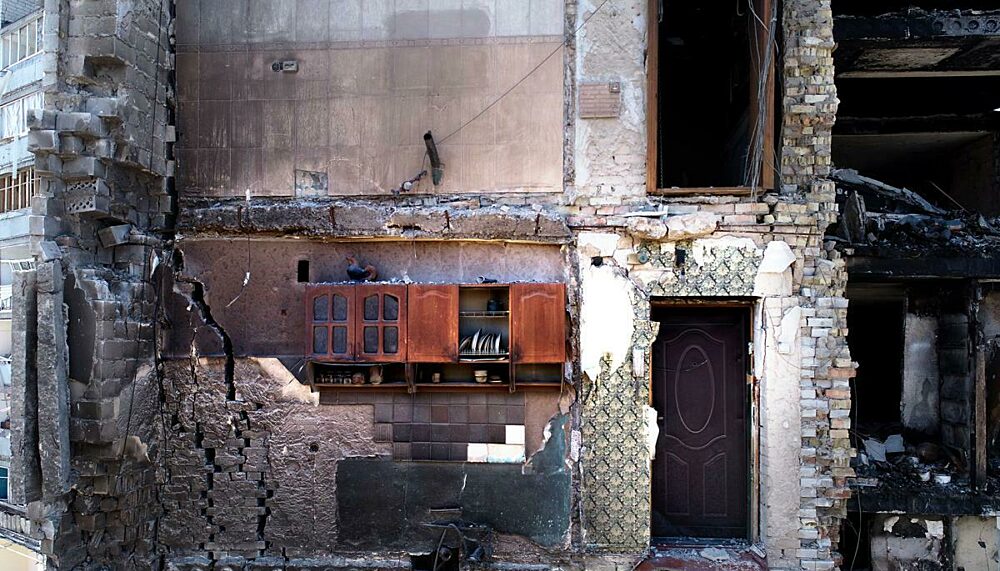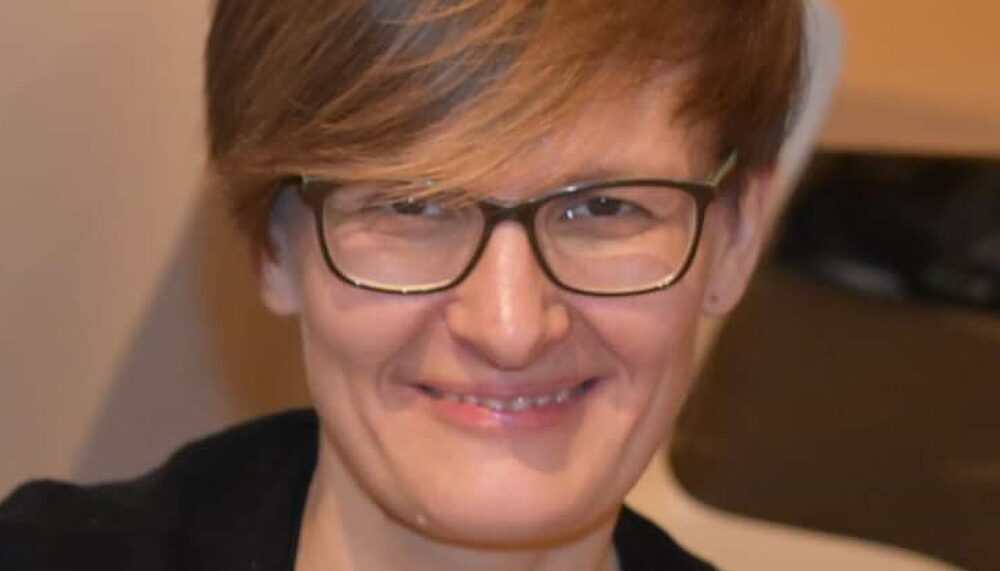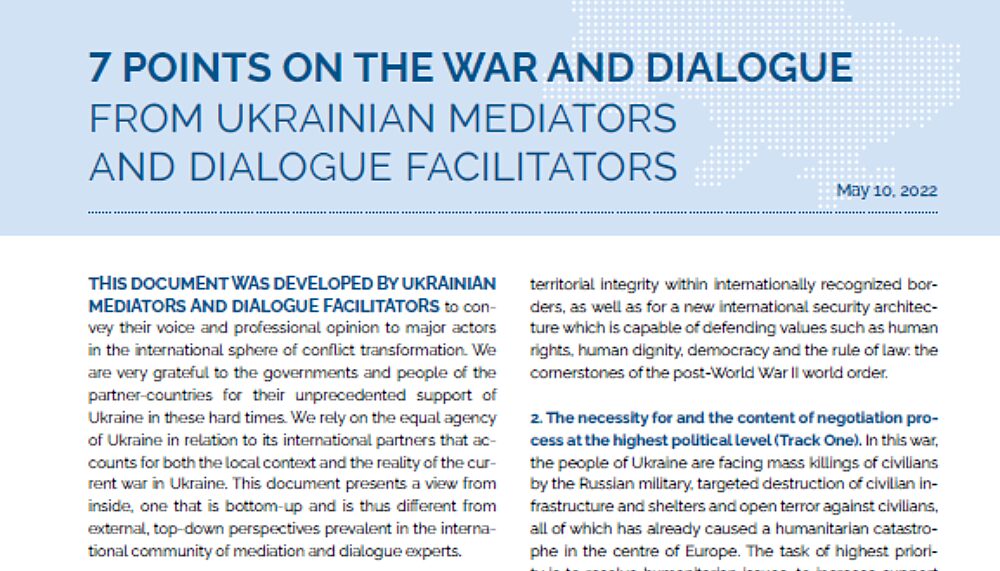FEATURE | 3 Aug 2022
Peace for Ukrainians means their own resilience to withstand aggression:
Interview with Ukrainian peace researcher Tetiana Kyselova

To support Ukrainian peacebuilders, international organisations need to listen to local activists and their needs.
The war in Ukraine is a watershed moment for the field of conflict transformation and mediation. There are no easy answers for peacebuilding organisations on how best to contribute to a peaceful, sustainable and just solution to this conflict. In order to find an approach that is locally owned and led, it is crucial to listen and give space to Ukrainian voices, especially to our peacebuilding colleagues who have led peace work in Ukraine for decades.

Tetiana Kyselova is a leading scholar on multitrack dialogue and peacebuilding from Ukraine. Together with other Ukrainian peace researchers and professionals, she has co-authored a thought-provoking statement addressed to the conflict resolution community. She is also part of the USESA team that we will initiate our collaborative EMBRACE project with, to work towards promoting democracy in conflict-ridden societies in the European neighborhood. We had the chance to interview Tetiana about the current war in Ukraine.
Berghof Foundation: Thank you, Tetiana, for taking the time. First, let me ask, how are you holding up? What are your coping mechanisms?
Tetiana Kyselova: Currently, all Ukrainians are in a very difficult situation. Although it has only been four months, for Ukrainians this war feels like ages. For many Ukrainians, one coping mechanism is to support a Ukrainian victory. I personally do small things like donating to the army, and donating to humanitarian aid. I do this for my colleagues who are still in the field, and who are fighting back at home.
But my work is a part of the response as well. Together with other Ukrainian mediators and dialogue facilitators, we have launched several projects as rapid conflict response to strengthen the social fabric within Ukrainian society. We need to help people to cope with stress, in order not to allow conflicts to drag us back to all the divisions that every society has. It is very important to remain strong and united in these challenging times.
BF: Amidst the many challenges during this war, including military resistance, accountability for war crimes, humanitarian assistance etc., do you see chances for dialogue and mediation approaches in Ukraine?
For Ukrainians, the war did not start in February 2022, but we have been living in a state of war since 2014. Our previous experience shows us that we do need dialogue.
TK: For Ukrainians, the war did not start in February 2022, but in 2014. We have been living in a state of war for eight years and our previous experience of this situation showed us that we do need dialogue. It is crucial to define how dialogue and peacebuilding efforts should look like. Obviously, political negotiations at the highest level – track 1 – are necessary alongside military resistance. Unfortunately, these two have to go together. As mediators, we do not see how Ukraine can resolve this conflict through political means alone. The external aggression has been recognised by most countries in the world through UN resolutions and other documents, and there is clearly an aggressor state and a defending state. So, for the moment, it is crucial to support Ukraine by supplying weapons. We as Ukrainian peacebuilders and mediators also call for this.
At the same time, efforts for political negotiations are crucial, even though so far, no one really found a good way to transform negotiations with Russia into something constructive. Looking at civil society involvement and negotiations between either public opinion leaders or NGOs and activists – track 2 – there are many calls from colleagues, from peacebuilders all over the world, to sit at one table with Russians and talk. During the hot phase of the war, as a community of professional mediators and dialogue facilitators, we believe that if such talks are not prepared and facilitated properly, they can actually do more harm than help. We compiled a statement, which explains this paradox and why, all of a sudden, Ukrainian mediators are not actively calling for more dialogue with Russians. We are not against dialogue as such, but we call for local ownership in designing such dialogues and a very cautious approach of Do No Harm to people.
BF: What would be needed to initiate such dialogue processes?
TK: There are two things to keep in mind about starting a dialogue process between Russian and Ukrainian civil society. One is that we are still in the hot phase of a war. While Ukrainians defend themselves, they – naturally – are particularly hostile and aggressive towards the Russian state and Russians. This aggression helps them to fight back, and it has enormous power, even if this is, unfortunately, a destructive power. In this situation, it is quite dangerous to bring people to one table. Many of my colleagues consider requests for Russian-Ukrainian dialogues as psychological violence. Currently, they cannot even think about talking to Russian people.

The second thing to keep in mind is a strong asymmetry between the two sides: The war is taking place on Ukrainian territory (although there are soldiers dying on both sides), there are only Ukrainian civilian casualties and all destruction happens in Ukraine. Also, there is asymmetry in the status and role of civil society in Ukraine and in Russia. In Ukraine, we have a very vibrant, professionalised and large civil society with 250,000 registered civil society organisations prior to the war. Unfortunately, research suggests that Russian civil society is not able to influence anything or to mobilise. These asymmetries make it unlikely that civil society dialogue would have meaningful impact at the resolution of the conflict.
Putting all of this together, as Ukrainian mediators and peacebuilders, we do think Russian-Ukrainian dialogues are not impossible, but they are very challenging and might only work under certain conditions. One of those might be a regime change in Russia as well as at least some kind of recognition of war crimes and compensation for war crimes from Russia’s side.
BF: What about dialogue formats within the Ukrainian society?
TK: We believe that dialogue at intra-Ukrainian dimension has the most potential. Even before the war broke out, I did research on different dialogue processes and we found that 90% of them took place between Ukrainians. Our research also shows that dialogue is a very useful instrument to improve social cohesion, trust between the government and civil society, and the ability to constructively communicate with each other in order to find mutually beneficial solutions to problems. Even now during the war, this is where dialogue can be a most useful tool. At the moment, the biggest challenge is that the Ukrainian government and also mainstream civil society do not see the need for such processes. We see a lot of talks and activities around reconstruction and recovery of Ukraine but it is quite difficult to push for real inclusive, open dialogue because it would require massive investments and support, and people have to understand the value of the outcome, in order to be willing to invest time, energy and resources.
BF: How can peace organisations, such as Berghof, best support Ukrainian conflict resolution experts?
TK: We see several ways how international peace organisations can support. On the one hand they should really strengthen local ownership. Of course, most international organisations, have declared to be committed to try to help local people based on the principle of local ownership. But beyond such declarations, this often plays out to be difficult, especially in an emergency situation like the one we have now in Ukraine. So, for Ukraine we advocate for a rather bold approach in terms of local ownership - simply do what local activists ask for. In many cases, people would ask for financial support, for example to pay salaries for those who work in the initiatives. But this is something most international peacebuilding organisations would not be willing and equipped to provide. They want to implement conferences, events, capacity building trainings, and bring in international expertise. What Ukrainians need instead is straightforward financial and material support for people who do the actual work on the ground.
On the other hand, volunteer initiatives and the people who organised them are in desperate need of psychosocial support. This is very much neglected by the Ukrainian government and by the volunteers themselves, although they need rehabilitation, rest and recuperation. Providing psychosocial support is very much about peacebuilding. Restoring relationships between people and preventing conflicts or polarisation within the country is not possible, if people are traumatised. So, we have to provide crisis support for their mental health to deal with their individual traumas first. As soon as they receive this support, they will be capable to work and to relate to others and this is where mediators and dialogue facilitators can come in to work towards conflict resolution and reconciliation.
So, I think, it requires a level of courage from international organisations to break some of their conventional approaches and to really apply emergency approaches to the situation at hand, and to listen to local activists and their needs.
*The rooster-shaped jug, also known as a “Vasylkiv cockerel”, remained untouched sitting on a kitchen cabinet in a destroyed high-rise building in Borodianka.
Read how it became a talisman that embodies resistance for many Ukrainians, after photographer Elizaveta Servatyanksa published the photo.
The cabinet was dismantled and handed over to the Maidan Museum in Kiev.
Media contact
You can reach the press team at:
+49 (0) 177 7052758
email hidden; JavaScript is required


